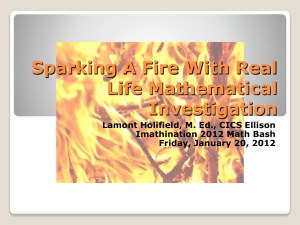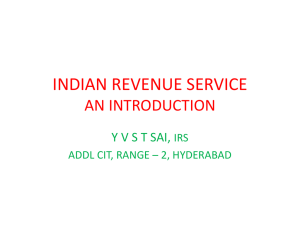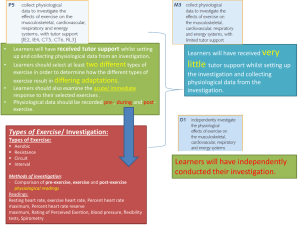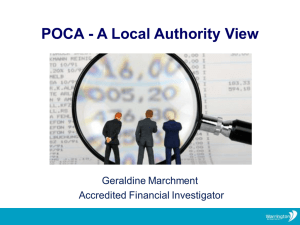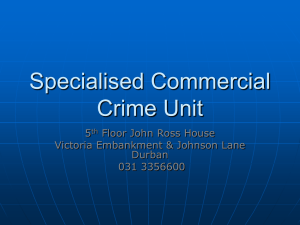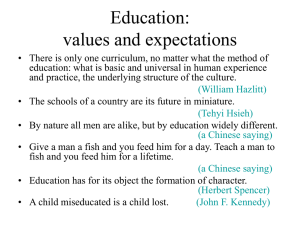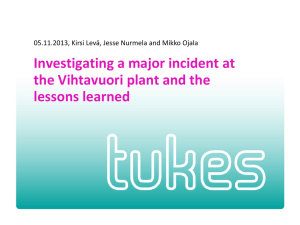Resources and Practical Activities
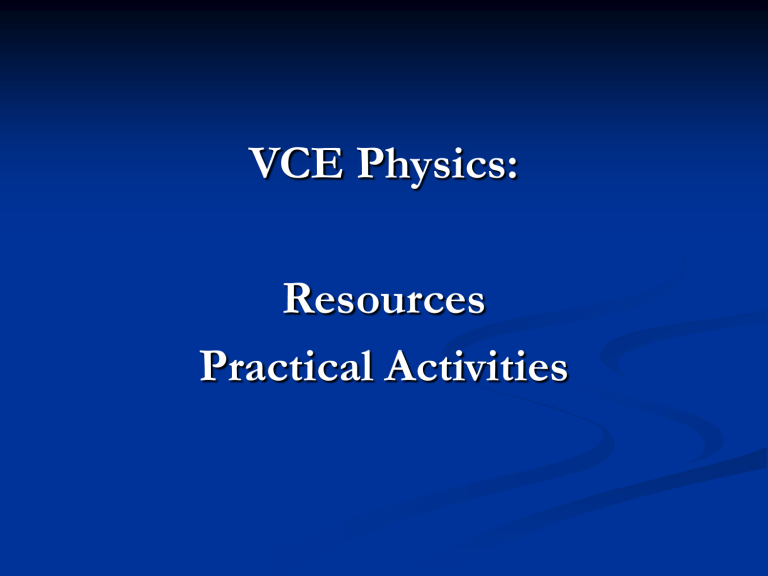
VCE Physics:
Resources
Practical Activities
VCE Physics
Resources for Teachers
Text
CDROM
Websites
Forums
Resources
Formats:
Resources
Text:
VCAA Resources List (21 pages)
Teacher’s Guides
Old Prac Guides: Gardiner & White;
Brian McKittrick
Old Problem books: G & McK; Boydell
(Checkpoints)
Old Exam and Trial papers: STAV,
NEAP, CSE formerly IARTV, QATs,
Kilbaha, TSFX, TSSM
Resources
CDROMs:
Colin Hopkins
Teacher Support kits
Conference Proceedings: Pre 2000
Resources: Websites
VCAA
Study Design Resources List
Assessment Handbook Exam papers
Exam reports Use of Calculators
www.vicphysics.org
Pages for:
Beginning teachers
Conferences
Each Area of Study
Students
Events
Issues & News
Textbook sites
Resources : Websites
Institute of Physics (UK) http://www.iop.org/
Support for beginning teachers:
* “I am new to teaching physics”
* www.talkphysics.org
* SPT: Supporting Physics Teachers Resources
American Association of Physics Teachers
(AAPT), http://www.aapt.org/ under Resources:
* ComPADRE, http://www.compadre.org/
* Physical Science Resources Center: PSRC
Resources : Websites
National STEM Centre (UK) http://www.nationalstemcentre.org.uk/
An e-library of resources across S, T, E and
M
Physics: 1549 resources going back to the
1960’s.
Select by age, year of publication, style (22 choices), format and publisher.
Includes over 500 activity sheets and 200 text books.
Forums
www.vicphysics.org
A local forum
www.talkphysics.org
A forum for UK teachers, but well supported and full of useful ideas.
Practical Activities
Types / Styles
Criteria for selecting Activities
Reporting
Assessment
Types / Styles of
Practical Activities
Types / Styles of
Practical Activities
Familiarisation exercise
Exploration
Simulation Demonstration
Self paced activity Class exercise
Formal experiment Investigation
Excursion Prac Test
Types / Styles of
Practical Activities
Examples
Familiarisation exercise
Using a CRO and other devices
Exploration
Introductory Light activities
Dissection of a DC motor
Types / Styles of
Practical Activities
Examples
Simulation (Spreadsheet investigation)
Radioactive Decay
Telescope
Planetary data
Demonstration (POE)
Properties of a, b and g
Magnet in Al tube
Types / Styles of
Practical Activities
Examples
Self paced activity
Booklet of Electricity experiments
Booklet of Electronics exercises
Class exercise
Half life experiment
Photoelectric Effect experiment
Twirling a tuning fork at the ear
Types / Styles of Practical
Activities
Examples
Formal experiment
Snell’s Law
Net F = ma
Circular motion
Magnetic field of a solenoid
Investigation
Numerous
Types / Styles of Practical
Activities
Examples
Excursion
Prac Test
VCE Physics Day at Luna Park
Australian Synchrotron
Scienceworks
VSSEC
CSIROSEC
DC Circuit measurements
Location of virtual image
Criteria for selecting
Practical Activities
Selecting both the activity and the type:
Learning benefit
Equipment
Time
Comfort level
Behaviour
Reporting
How should the students present what they have learnt?
Oral
Poster
IT based
Written
* Answers to set questions
* Log book entry
* Formal write up
Assessment
Alternatives can range from:
Completed? Y/N
Overall grade, A - E
Raw score out of 10
Satisfactory completion
Criterion referenced
Unit 2: Practical Investigation
They design and undertake more complex investigations involving at least one independent, continuous variable, and take increasing responsibility for the design of investigations .
Unit 2: Practical Investigation
Students:
identify a problem or research question and formulate a prediction or hypothesis,
select at least one relevant independent continuous variable and recognise controlled variables.
adapt or extend given methods, or at least partly design their own methods, for the control of variables
Unit 2 Practical Investigation
Students also:
systematically collect and record sufficient relevant data for simple investigations including correct use of units, symbols and formulas.
account for sources of error and uncertainty, evaluate limitations of, and weaknesses and errors in, techniques and equipment.
Identify alternative interpretations of data and results.
Units 3 & 4
Extended Practical Investigation
They design and carry out an extended practical investigation. They collect accurate data, evaluate the quality of data and measurement processes, and make conclusions based on the data.
Units 3 & 4
Extended Practical Investigation
Students: select focused research questions and formulate a quantitatively testable hypothesis.
identify variables of significance to an investigation and decide the appropriate variables to be controlled. adapt or extend given methods, and design their own methods, for the control of variables and the systematic collection of sufficient relevant data ..
record raw qualitative and quantitative data accurately and
…
Units 3 & 4
Extended Practical Investigation
Students also:
present processed data, including correct use of units, symbols and formulas, to ensure that relationships between variables are evident.
identify sources of error and estimate uncertainties in, and reliability of, data and derived quantities.
analyse procedures and results, taking into account limitations of, and weaknesses and errors in, techniques and equipment.
Identify and explain alternative interpretations of data and results.
(Extended) Practical Investigation
Teacher’s decisions:
How much class time?
From which Area of Study to choose topics?
How much topic choice to give the students?
Group size?
How much home time? Use of log books?
Format for the write up?
Marking procedure?
Your role?
Units 3 & 4 Assessment
Extended Practical Investigation (EPI)
Marking Procedure
VCAA Assessment Booklet
Descriptors for EPI
Descriptors in table format
Units 3 & 4 Assessment
Report on selected Practical Activities
Teacher’s decisions:
Which Area of Study to choose pracs from?
Which pracs?
Use of log books?
How much home time?
Format for writing report?
Structure of the report?
Marking procedure?

